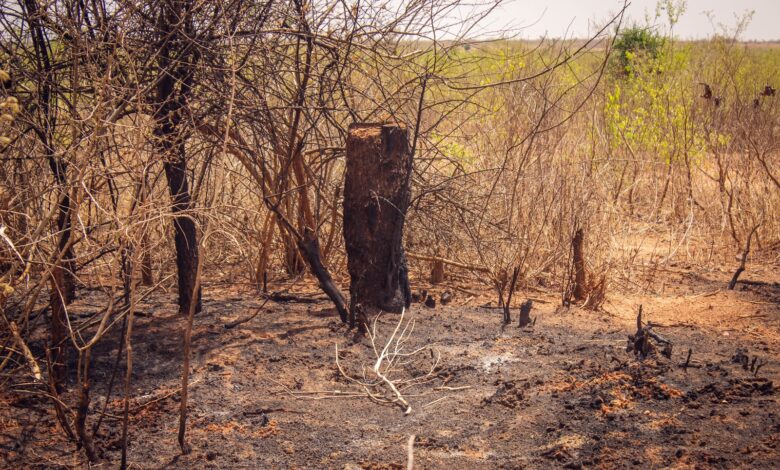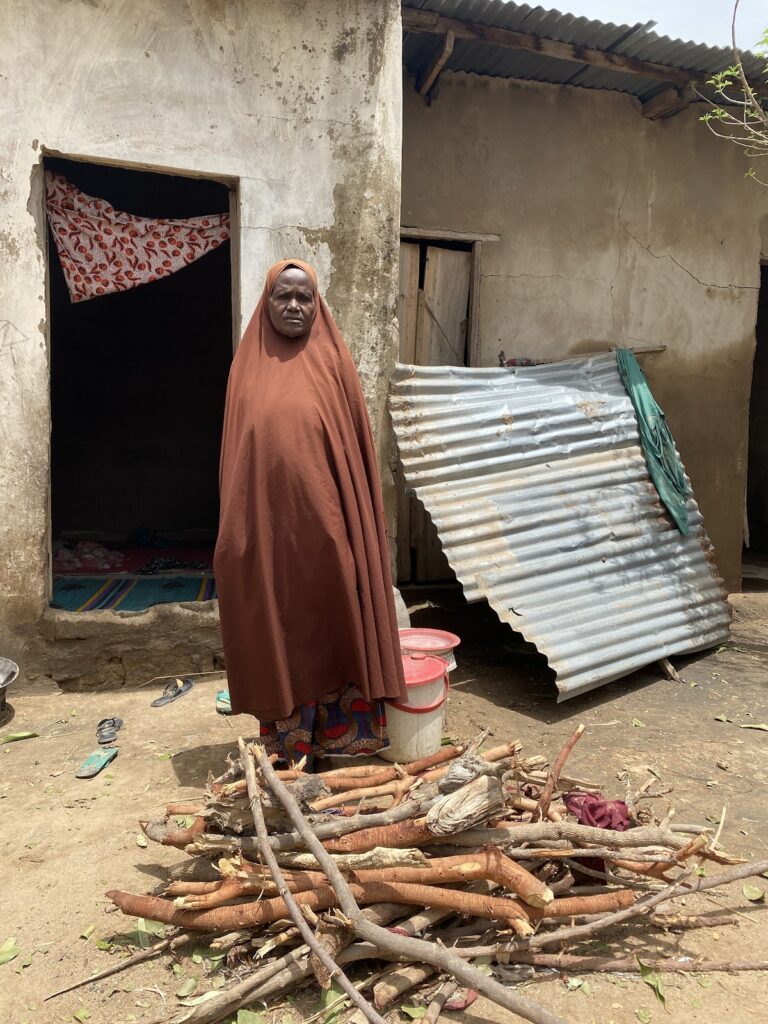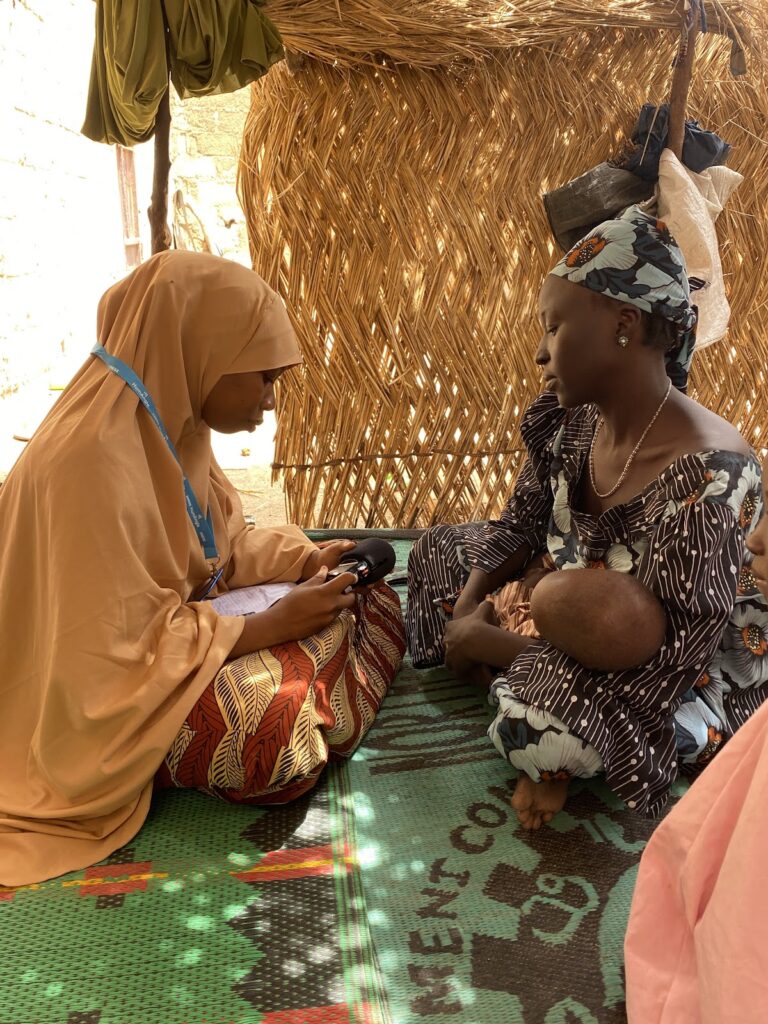Victims Of Armed Conflict Turn To Deforestation To Earn A Living In Northeast Nigeria
Driven by economic hardship in their resettled communities, Bama residents in Nigeria’s Borno state turn to the unsustainable practice of woodcutting to survive.

Adam Mustapha, a 37-year-old father of five in Bama, a town in central Borno state, northeast Nigeria, navigates the challenges of a life reshaped by conflict. Adam was a vegetable trader but is now forced into a new line of work: selling firewood.
Nine years ago, he was displaced to Bama because of the Boko Haram insurgency.
“This is not what I chose to do,” Adam reflects, “but life happens, and this is where I have found the means to survive.”
Each day, Adam, accompanied by friends, ventures five to six kilometres into the forest. There, they cut down dried trees, a preferred choice for ease of handling and market demand. However, their work is fraught with danger. “Sometimes we get the wood, sometimes we don’t because we are chased by Boko Haram insurgents,” he reveals.
Despite the risks, Adam is driven by the need to support his family. The firewood trade has seen an increase in participants, all seeking survival amidst the ongoing conflict. Yet, their efforts create another problem: environmental concerns.
Authorities have started implementing measures, such as sometimes restricting Adam and others from entering the forest. They have even informed them that desertification would result from their continued actions.
He understands the ecological impact but feels trapped by circumstances. “I don’t have any options to change this business. But if authorities give us the chance to do something else, I will gladly accept it because this business comes with many challenges,” Adam told HumAngle.

Fifty-nine-year-old Zara Goniye’s story follows a similar line. Once living a peaceful life at Tashan Bultu in Bama town with her family of eight, she now navigates the challenges brought on by the armed conflict.
Ten years ago, Zara was renowned for her culinary skills, particularly for making the tastiest buns and local pasta. With two pasta-making machines, she produced enough to sell, bringing stability to her family.
However, the insurgency disrupted this idyllic life, forcing Zara and her family into displacement in Yarimari, a village near Bama. Although she was eventually able to return to her community, Zara’s circumstances had drastically changed. Health issues and advancing age have added to her struggles. Suffering from hypertension, she reluctantly turned to cutting and selling firewood to make ends meet. “This is not something I can even bear doing due to my health challenge,” she says. Each day, Zara and her grandchild go into the forest at 8:00 a.m., returning home by 1:00 p.m. with their firewood haul, selling 30 pieces for ₦500.
Despite the physical toll, Zara continues this arduous work, noting that while they cut trees daily, there is no effort to plant new ones. “We just do what brings us and find our ways out,” she admits.
Zara dreams of returning to her former life, where she joyfully woke each day to a thriving business and loyal customers who relished her culinary creations. She reflects wistfully, “I do hope my life will be like before.”
From the farm to the woods
Ashe Kachalla, a 30-year-old mother of six who has taken refuge in Bama for the last two years, engages in the same arduous task of cutting and selling firewood to support her family.
Each day, Ashe and many others go into Iza, Bula Kuli or Bulongu village forests surrounding Bama. These journeys, often made by groups numbering in the fifties, forties, or even hundreds, are evidence of the desperation of internally displaced persons (IDPs) and other less privileged individuals seeking sustenance.
“I remember how we used to go to the farm with our hearts full of hope and a peaceful mind years back,” Ashe recalls. “We had enough food to eat, unlike now when we rely on tree cutting to satisfy our hunger.”
With a hint of sadness, Ashe explains her daily routine. She collects packs of firewood and sells them for ₦600 to ₦800 each. The money is essential for daily necessities like maize grit and soup. However, the toll of this work is evident. “I couldn’t go today because my little child is sick, but I had to send my other children to the forest,” she shares.

Despite the dangers, including encounters with insurgents who now largely ignore them, Ashe continues this work out of necessity. Recently, community elders have advised replanting trees to mitigate environmental impact, a small step toward sustainability in their desperate situation.
“This is not something I like doing,” Ashe admits. “I have to survive, and this is the only option for me. If I could find another form of tangible business, nothing would make me go to the forest again.”
Ashe longs to return to her previous trades of farming and the sale of bean cakes.
Falling trees… to clear hideouts and for livelihood
Mallam Gana Alhaji, a 60-year-old retired teacher, shared his perspective on the drastic changes the town has undergone due to insurgency.
He said that before the crisis, Bama was surrounded by various trees. However, the insurgency has significantly altered the landscape. According to Mallam Gana, trees are now being cut down indiscriminately, exacerbated by three main factors.
The first factor emerged when the government identified that the dense forests provided cover for insurgents. Security forces were instructed to clear trees within a 5km radius around the town to eliminate potential hideouts.
Secondly, the insurgents themselves uprooted fruit-bearing trees like mango, guava, and banana to deprive captives of shade, adding to the environmental degradation.
The third issue is poverty. Many residents, driven by the need to survive, cut down trees to sell firewood. This has become a common sight, even young children participating in the trade. Despite mobilisation efforts by the government, traditional councils, and other authorities to educate the community on the environmental impacts, illiteracy and immediate survival needs hinder progress.
In May 2024, the local government chairman, Honourable Ali Gujja, and representatives of the state Ministry of Forestry toured the affected areas to assess the situation and enforce measures to stop illegal tree-cutting, according to Mallam Gana.
However, the efforts faced resistance, as people argued that without alternative means of livelihood, they could not be stopped from cutting trees. A meeting followed, leading to a policy where individuals must plant five trees for every tree they cut, with strict monitoring.
Despite these measures, the effect of deforestation in the area is apparent. This year’s heat wave is unprecedented, and many edible fruit trees, such as wild cherries popularly known as Dadun and Moloria, have vanished in the forest.
Mallam Gana emphasises that poverty is rampant and must be addressed to resolve these issues. He advocates for broader poverty alleviation efforts across Nigeria, investment in alternative livelihoods, and improved farming conditions. He asserts, “People shouldn’t always be provided with food; they should be shown how to get it.”
Authorities must strengthen existing policies and raise awareness about the environmental consequences of tackling deforestation. Only through a comprehensive approach can Bama and similar communities hope to overcome these challenges.
* This story was produced under the HumAngle accountability fellowship.
Support Our Journalism
There are millions of ordinary people affected by conflict in Africa whose stories are missing in the mainstream media. HumAngle is determined to tell those challenging and under-reported stories, hoping that the people impacted by these conflicts will find the safety and security they deserve.
To ensure that we continue to provide public service coverage, we have a small favour to ask you. We want you to be part of our journalistic endeavour by contributing a token to us.
Your donation will further promote a robust, free, and independent media.
Donate HereStay Closer To The Stories That Matter




